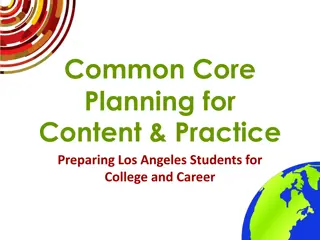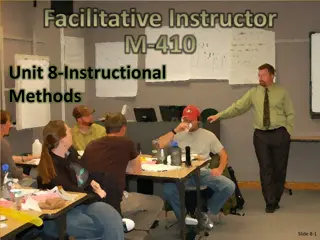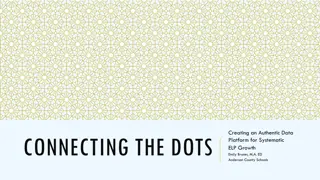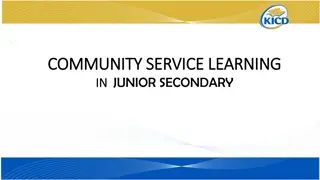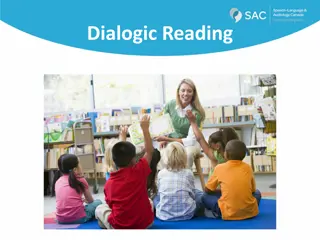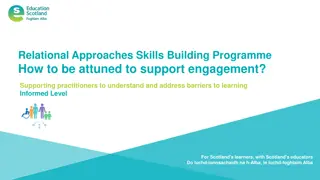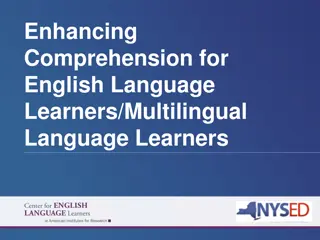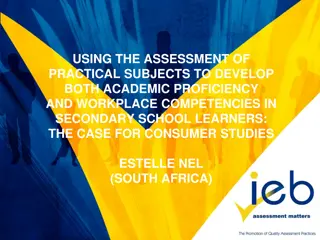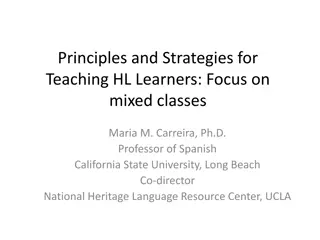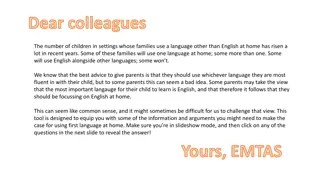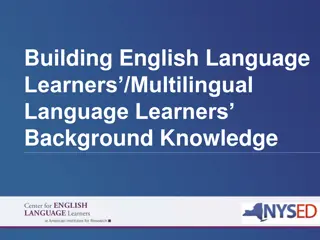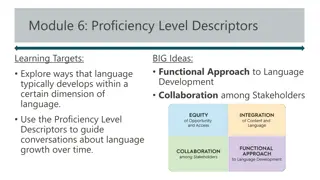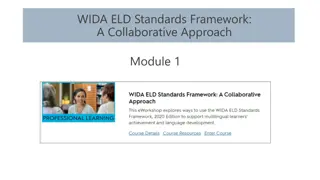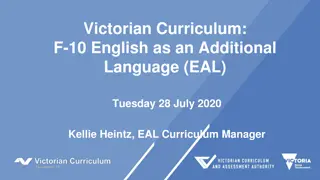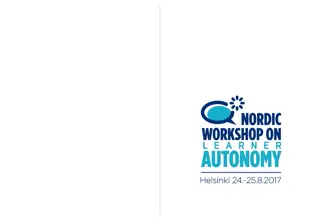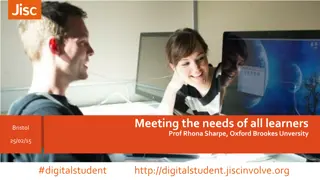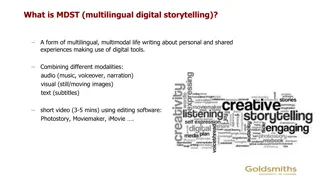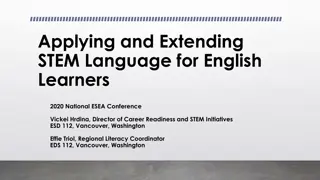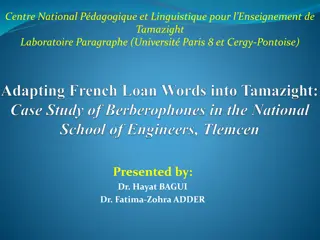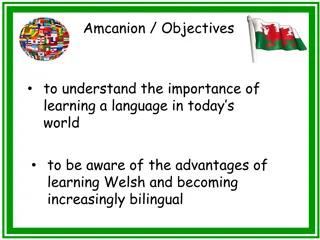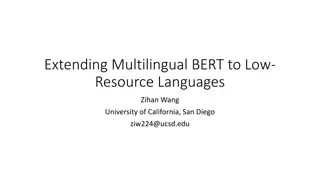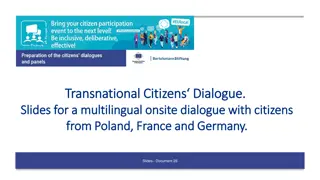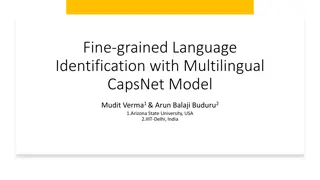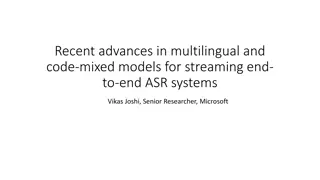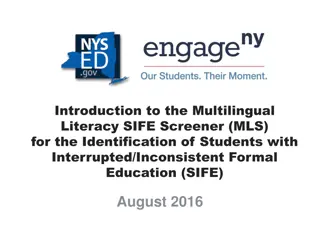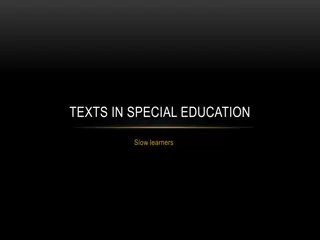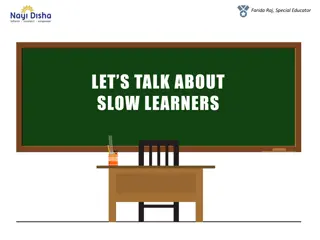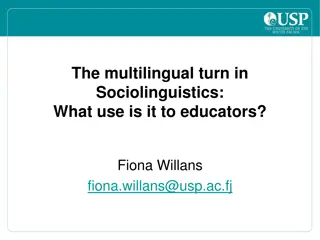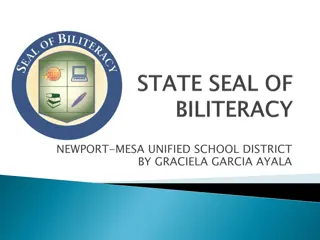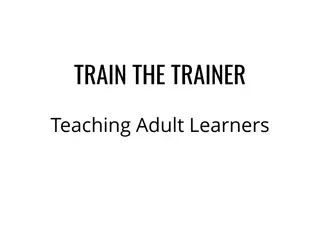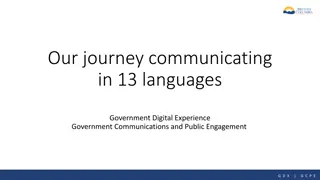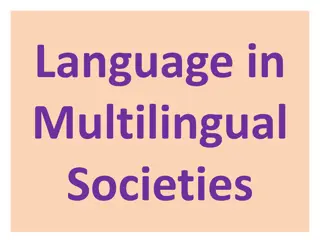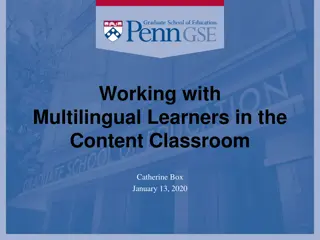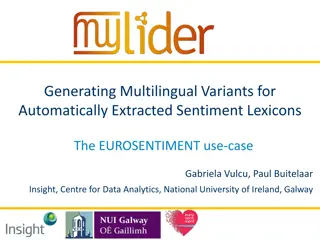Supporting Transitions for Autistic Learners in Scottish Education
This professional learning module focuses on supporting autistic learners in Scotland through effective transitions. Topics covered include terminology, the Scottish context for autism and inclusion, understanding autism, assessment and monitoring, supporting learners and families, social and emotio
0 views • 21 slides
Transformative Journey: Charting Unique Learning Needs in Hamblen County
Embark on a transformative journey in Hamblen County to address the unique learning needs of a diverse student population through data-driven initiatives, collective responsibility, and a commitment to high-quality education. Explore the district's vision, key statements, and next steps towards inst
1 views • 34 slides
Language Expectations and Functions in Educational Units
Explore the importance of unit language goals in educational settings, focusing on identifying language expectations, functions, and features. Understand how to describe language use for content learning and support multilingual learners. Examples from science and ELA units illustrate practical appl
8 views • 11 slides
Enhancing Common Core Aligned Math Lessons for Los Angeles Students
Plan and implement Common Core aligned problem-based math lessons using John Van de Walle's Three-Phase Structure to prepare Los Angeles students for college and career success. Explore strategies to cater to diverse learners such as English learners, Standard English learners, Students with Disabil
4 views • 23 slides
Effective Instructional Methods for Adult Learners
Explore six effective instructional methods for adult learners, including advantages and limitations of each. Learn how to mitigate behavior problems associated with adult learners. Discover appropriate methods for teaching first aid, FireWise principles, disseminating policy information, and discus
0 views • 13 slides
CONNECTING THE DOTS
Explore how the Ellevate Learning Program at Anderson County Schools emphasizes discovering and supporting students' assets, implementing systematic ELD support, and analyzing data to drive linguistic growth. The program caters to a diverse group of multilingual learners, focusing on individual stre
0 views • 24 slides
Enhancing Learning Through Community Service Learning in Kenya
Acknowledging the lasting impact of engaging learners in community service, Kenya is shifting focus towards Community Service Learning (CSL) to foster holistic development and prepare learners for the workforce. Emphasizing experiential learning, CSL integrates classroom education with community ser
0 views • 21 slides
Pedagogical Shift in Physical Science: Constructing Knowledge Through Learner-Centered Experiences
There is a significant pedagogical shift in physical science education from viewing science as a fixed body of knowledge to emphasizing the process of constructing knowledge. Learners are now placed at the center stage, engaging in inquiry-based learning, critical thinking, and collaborative interac
3 views • 21 slides
Comprehensive Guide to Dialogic Reading for Language Development
Dialogic Reading is a systematic activity where an adult and child engage in shared reading, focusing on building oral language through interactive techniques like reading aloud, storytelling, and making connections with the child's experiences. This method enhances vocabulary, language skills, and
1 views • 26 slides
Building Effective Relationships for Supporting Learners in Scotland
This program focuses on relational approaches and skills building to support engagement and address barriers to learning for Scotland's educators and learners. It emphasizes the importance of attunement, empathy, and positive relationships in creating a conducive learning environment. Understanding
0 views • 17 slides
Enhancing Comprehension for English Language Learners/Multilingual Language Learners
This presentation focuses on scaffolding English language arts instruction to enhance comprehension for English Language Learners (ELLs) and Multilingual Language Learners (MLLs). It covers strategies like close reading, building background knowledge, and vocabulary development. The goal is to suppo
0 views • 73 slides
Enhancing Academic Proficiency and Workplace Competencies in Secondary School Learners through Consumer Studies Assessment
In South Africa, the National Senior Certificate (NSC) and the Independent Examinations Board (IEB) play crucial roles in assessing learners' academic proficiency and workplace competencies. Consumer Studies, as an elective subject, is integral in developing responsible consumer behavior and equippi
1 views • 23 slides
Teaching Strategies for Heritage Language Learners in Mixed Classes
Explore essential concepts in teaching heritage language learners in mixed classes, focusing on project-based teaching. Understand the characteristics of native speakers, heritage speakers, and second language learners. Learn about the motivations of heritage language learners and the implications f
1 views • 48 slides
Speech and Language Developmental Milestones: A Bilingual/Multilingual Perspective
Speech and language developmental milestones are crucial for children, regardless of their home language. These milestones encompass receptive language, expressive language, pragmatics, and articulation and phonology. Understanding how a child hears and talks from birth to one year is essential, as
1 views • 23 slides
Supporting Multilingual Children in Early Years Settings
The number of children in settings with families using languages other than English has increased, raising questions about language use at home. Encouraging parents to use their most fluent language supports secure bonding, cognitive development, and speech skills. Growing up multilingual has variou
2 views • 8 slides
Effective Strategies for English Language Learners/Multilingual Learners
Welcome to the presentation series sponsored by the New York State Education Department Office of Bilingual Education and World Languages. This first presentation focuses on building background knowledge to support teachers in scaffolding English Language Arts instruction for ELLs/MLLs. Discover met
0 views • 43 slides
Language Development and Proficiency Level Descriptors in Educational Settings
Explore the Proficiency Level Descriptors and characteristics of language development in different dimensions, focusing on ways language evolves and the collaboration among stakeholders. Delve into how discourse progresses across the six proficiency levels and how teachers can utilize PLDs to suppor
0 views • 8 slides
Exploring the WIDA ELD Standards Framework - Module 1 Activities
This content focuses on Module 1 of the WIDA ELD Standards Framework, emphasizing the importance of connecting current knowledge and practices within an educational setting. Educator perspectives, navigating module activities, and engaging with the framework are highlighted, encouraging reflection a
0 views • 8 slides
Importance of the New Victorian Curriculum F-10 EAL
The new Victorian Curriculum F-10 EAL aims to establish EAL as a standalone curriculum, provide a consistent structure across all learning areas, and recognize the diverse backgrounds and learning experiences of EAL students in Victoria. It also focuses on supporting the specific needs of EAL studen
0 views • 29 slides
Language Learner Autonomy Conference Programme Overview
The Language Learner Autonomy Conference spans three days full of insightful presentations, workshops, and discussions focusing on fostering learner autonomy in multilingual environments. The event includes diverse topics such as identity, social learning spaces, and empowering learners through embo
0 views • 14 slides
Meeting the Needs of All Learners in the Digital Environment in Further Education
Prof. Rhona Sharpe from Oxford Brookes University discusses how learners experience the digital environment in further education, highlighting the importance of meeting the diverse needs of learners. The content covers various aspects such as vocational backgrounds, prior educational/work experience
0 views • 13 slides
Engaging Young Minds Through Multilingual Digital Storytelling
Explore the world of multilingual digital storytelling, a creative way for children and young people to share personal and collective experiences using audio, visual, and text elements. This approach fosters collaboration, critical thinking, and creativity, with topics ranging from nature conservati
0 views • 8 slides
Enhancing Language Learning in STEM Education for English Learners
Explore the importance of incorporating language skills in STEM education to support English learners. Gain insights on fostering multilingual skills, understanding STEM vocabulary, and promoting cultural competence in the learning environment. Enhance connections between language, science, and engi
0 views • 38 slides
Multilingual Situation in Algeria: Influence of French Borrowings on Tamazight Varieties
The study conducted by the Centre National Pédagogique et Linguistique explores the intricate multilingual environment in Algeria, focusing on the incorporation of French borrowings in Algerian Arabic and Tamazight varieties. The research delves into factors leading Berber speakers to adopt French
0 views • 27 slides
Embracing the Power of Learning Welsh for a Multilingual Future
Discover the importance of language learning in today's global landscape and the advantages of becoming bilingual, with a focus on Welsh. Learning languages enhances cultural understanding, opens up new opportunities in travel, job prospects, and academic success, and fosters tolerance towards diver
0 views • 14 slides
Extending Multilingual BERT to Low-Resource Languages
This study focuses on extending Multilingual BERT to low-resource languages through cross-lingual zero-shot transfer. It addresses the challenges of limited annotations and the absence of language models for low-resource languages. By proposing methods for knowledge transfer and vocabulary accommoda
0 views • 21 slides
Transnational Citizens Dialogue Slides: Multilingual Onsite Event from Poland, France, and Germany
Explore the transnational citizens' dialogue slides designed for a multilingual onsite event involving participants from Poland, France, and Germany. The presentation covers welcome sessions, program details, topics of discussion, and capturing citizens' opinions on Europe. Engage in a comprehensive
0 views • 16 slides
Fine-Grained Language Identification Using Multilingual CapsNet Model
This study explores fine-grained language identification through a multilingual CapsNet model, addressing challenges such as short audio snippets, multiple languages, noise, limited training data, and non-class identification. The dataset includes various languages like Arabic, Bengali, Chinese, Eng
0 views • 36 slides
Challenges and Advances in Multilingual and Code-Mixed ASR Systems
Recent advances in multilingual and code-mixed models for streaming end-to-end ASR systems present challenges including low resource Indic language data, multiple dialects, code-mixing, and noisy environments. These challenges impact ASR modeling by causing convergence issues, higher Word Error Rate
0 views • 34 slides
Multilingual Literacy SIFE Screener for Student Identification
The Multilingual Literacy SIFE Screener (MLS) is a crucial tool for identifying students with interrupted or inconsistent formal education (SIFE). This screener helps schools and districts in assessing students' literacy levels in their home languages, guiding appropriate program instructions. Vario
0 views • 22 slides
Understanding Slow Learners in Special Education
Slow learners are individuals who take longer to grasp concepts and struggle with traditional academic demands. They are not disabled but may lack interest in conventional educational systems. It is important not to confuse slow learners with students needing special education or those who are non-c
0 views • 4 slides
Understanding Slow Learners: Characteristics, Signs, and Support Strategies
Learn about slow learners through the perspective of Farida Raj, a special educator. Discover the characteristics and signs of slow learners, such as difficulties in grasping abstract concepts, poor self-image, and slow task completion. Find out how to spot the signs and provide necessary support th
0 views • 14 slides
The Multilingual Turn in Sociolinguistics: Implications for Educators
Exploring the multilingual context in Vanuatu, this article delves into the historical evolution of language policies and their impact on education. It discusses the diverse language landscape in Vanuatu, the challenges faced by educators, and the shifting paradigms in language instruction over time
0 views • 27 slides
Multilingual Education Program at Newport-Mesa Unified School District
In response to new educational reforms, Newport-Mesa Unified School District is enhancing its language programs to prepare students for a multilingual world. With a focus on promoting diversity, encouraging the study of world languages, and fostering respect for other cultures, the district aims to
0 views • 13 slides
Understanding Learner Styles and Strategies
Learner styles and strategies play a crucial role in education. There are two main types of learners - Analytic Learners who focus on details first, and Holistic Learners who prefer understanding the whole concept. Analytical learners excel at recalling facts, excel in math and science, and are good
0 views • 37 slides
Understanding Adult Learners: Key Characteristics and Strategies
Characteristics of adult learners include being goal-oriented, self-directed, valuing past experiences, desiring respect, and having established habits and opinions. Understanding these traits is essential for effective teaching and training. Adult learners seek practical information, immediate feed
0 views • 47 slides
Multilingual Government Digital Communication Project for COVID-19 Response
This project, funded by the Ministry of Health, focuses on multilingual communication for COVID-19 response. It includes translating PHO orders, health safety information, vaccination details, and economic recovery resources into multiple languages to ensure accessibility and understanding for all c
0 views • 14 slides
Language in Multilingual Societies: Embracing Diversity
In multilingual societies, people navigate daily life using multiple languages for various purposes. From home to work to prayer, different languages play a crucial role in communication and social organization. The interaction of speakers of multiple languages in such environments can lead to langu
0 views • 22 slides
Supporting Multilingual Learners in the Content Classroom
Explore different strategies and resources for working with multilingual learners in the content classroom. Discover ways to differentiate instruction, support academic language development, and address the needs of gifted students and those with IEPs. Aim to challenge students in their learning zon
0 views • 27 slides
Multilingual Sentiment Analysis for Enhanced Language Resources
This presentation discusses the EUROSENTIMENT project focusing on generating multilingual variants for sentiment lexicons. Addressing challenges in sentiment analysis, the project aims to build a shared language resource pool to improve adaptability and interoperability of language resources. Object
0 views • 36 slides



